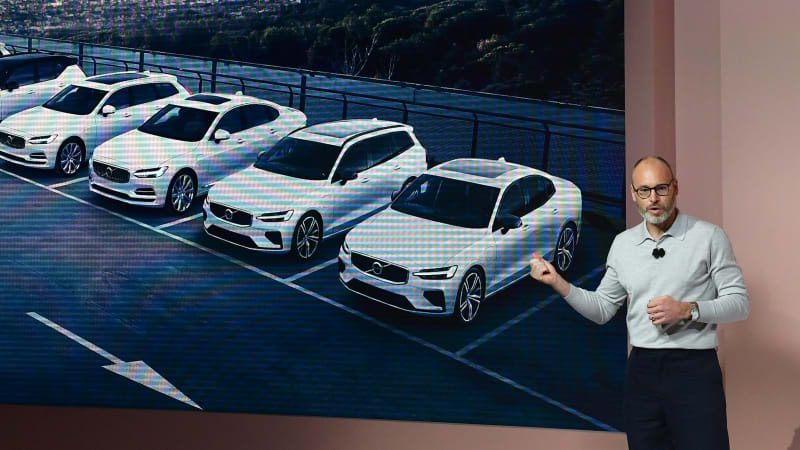Volvo vows to charge subscriptions only for major updates

Volvo Cars Chief Operating Officer Björn Annwall
BMW veered into a public-relations mess this year when it started charging car owners monthly subscription fees to warm their behinds. Volvo Car won’t be making similar moves.
“If you are to charge for software updates, it must be a step change in consumer benefit,” Volvo’s Chief Operating Officer Björn Annwall said in an interview this month. “We will not ask people who have bought a car for 1 million kronor ($96,500) to pay another 10 kronor to get extra heat in the seat.”
While BMW will no doubt have other manufacturers follow in its footsteps — Mercedes-Benz recently started asking buyers of its EQ electric vehicles to fork over $1,200 a year to unlock quicker acceleration, for example — the auto world has started to second-guess just how much money there is to be made from the rise of software within their hardware-intensive business. In a 91-page deep dive into the topic last month, analysts at UBS pegged the total addressable market at $700 billion by 2030. That’s no pittance, but pales in comparison to the $2 trillion opportunity they anticipated previously.
Annwall sees Volvo generating little additional revenue from software until mid-decade. Only if major upgrades become available — a self-driving mode, for example — would Volvo charge extra. “You don’t have to hold the steering wheel — now that’s a step change in user benefit.”
Annwall was speaking at the opening of Volvo’s new tech hub in Stockholm, where the manufacturer builds software for selling and marketing cars online. The company, which last month unveiled a battery-powered sport utility vehicle to succeed its gasoline-era flagship, intends to cease making combustion cars by the end of the decade. It’s going to be an uphill push: EVs made up just under a fifth of the company’s shipments last month.
Bloomberg spoke with Annwall about Volvo’s tech efforts, the software issues that have plagued some of its competitors and the ongoing supply-chain issues holding back the industry. Here are highlights from the conversation, which have been edited for length and clarity:
Large automakers including Volkswagen have had problems with their car software. Have you experienced similar obstacles?
I won’t hide the fact that we have had some problems with our software in the car as well. But we’ve been good at correcting them fairly quickly. It’s a huge change for an industry that has been very hardware-focused. All processes have focused on quality assurance of the hardware. Now a lot of the value is in the software, and we need to have processes in place to assure the software quality.
Your target is making 50% of the software you need in-house. How’s that going?
It’s going well. Fifty percent is more of an indication of where we want to go, that we should take much more control over this ourselves.
We have done a pretty good job there, above all in terms of car architecture, defining which parts of the software stack we should have control over, and where we can bring in partners that have better and cheaper solutions. That journey continues.
One area that is very important for us obviously is everything that has to do with safety, and that’s something we will develop in-house. But there’s no point for us to try to do better voice recognition than Google. We also currently don’t see a need to start developing semiconductors. It’s very complicated and requires a lot of scale.
Chips have been in short supply for quite some time. Have you been hit harder than other carmakers by supply-chain issues?
During the early phase of the pandemic, we had better delivery capacity than our competitors, and as a result grabbed significant market share. But in the last 1 to 1.5 years, we had a relatively poor delivery capacity, and we lost market share. That has not been driven by demand, as our order books are swelling.
We have had a fairly clear strategy that we use the same components across our cars and have a large commonality, which drives efficiency. But that also means that we are quite vulnerable if the supplier who manufactures that particular component is in a province in China where there are Covid restrictions, for example. Then we are hit pretty hard.
What are you doing about that?
There are no quick fixes, but we are working in a structured manner as we have always done. We produce cars where we sell them, and we will source where we produce.
We are also working on establishing relationships on certain key components. It could be semiconductors, it could be certain raw materials for batteries. Establishing a direct contact with a source is very important work, but it’s not something that can be done in two months or solve every problem.
Is the supply-chain situation starting to get worse again?
No, as we have said, we had quite a big hit during and after the summer. Over the last three months, we’ve seen a gradual and quite strong increase in production. It’s on the mend. But the danger is far from over. It will be a little messy next year as well.



